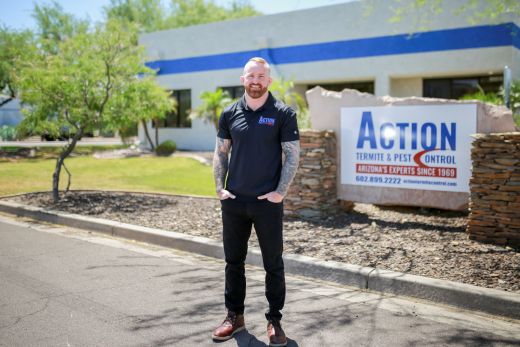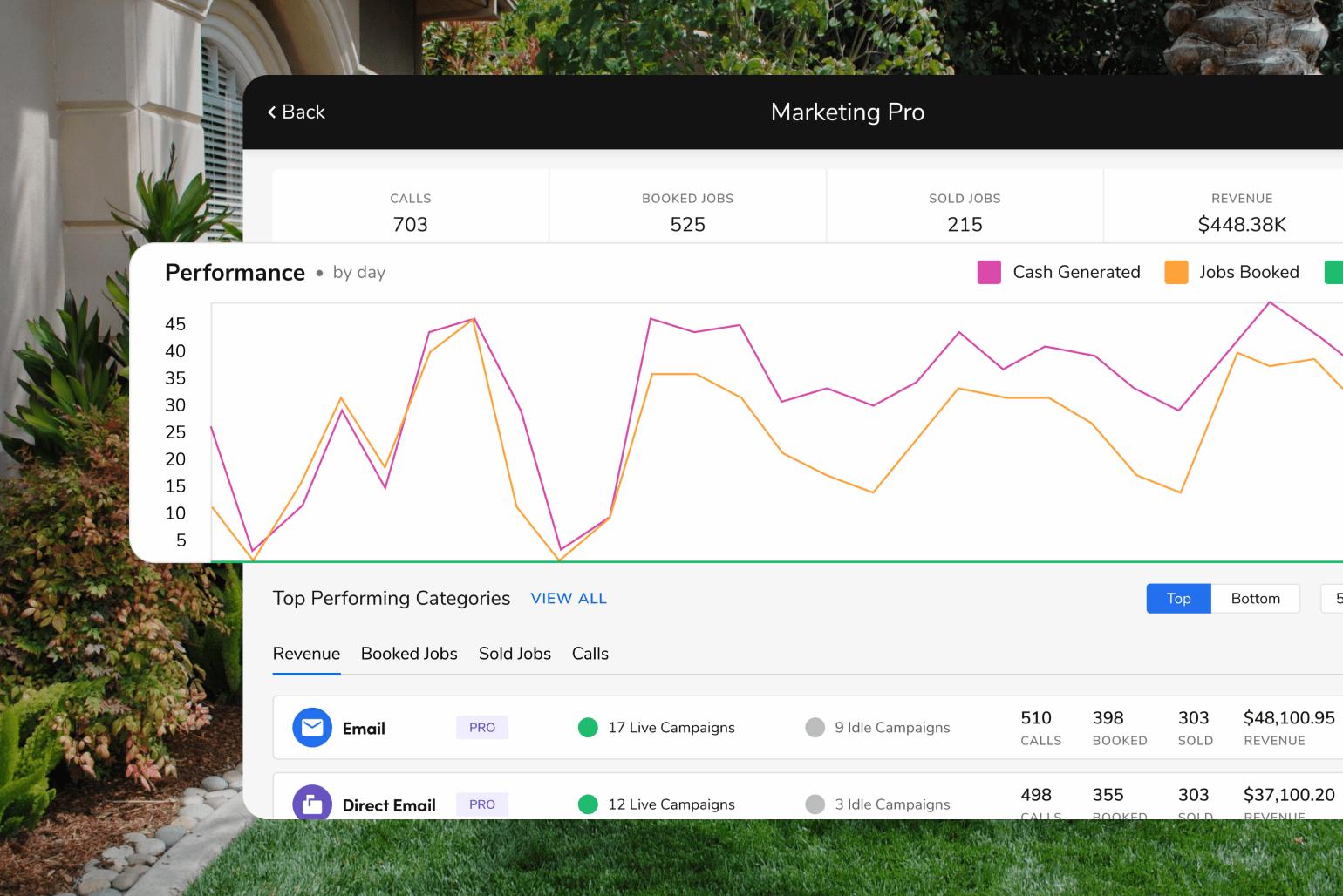How to Scale a Pest Control Business (+7-Step Guide)

Scaling a pest control business is exciting, but it comes with challenges. Managing increased demand, organizing operations, and attracting new customers requires a clear strategy. Cash flow, service quality, and customer satisfaction can suffer without the right approach.
To grow successfully, small business owners and entrepreneurs need to streamline operations, optimize pest control marketing, and leverage technology to stay competitive. Investing in pest control software, refining pricing strategies, and expanding service areas are key to sustainable business growth.
This guide provides step-by-step instructions for scaling efficiently, increasing profit margins, and building a stronger, more profitable pest control company.
Step 1. Evaluate Your Current Business Model
Before expanding your pest control business, assess your current operations. Growth without a plan can lead to cash flow issues, inefficient processes, and declining customer satisfaction. Understanding your strengths, weaknesses, and opportunities helps create a scalable business model.
Analyze Your Current Operations
Review your service offerings. Do you specialize in bed bug treatments, termite control, or general pest management infestations?
Identify scheduling, invoicing, or customer communication bottlenecks that slow down efficiency.
Evaluate your staffing levels—does your own pest control business have enough technicians to handle more clients?
Assess Your Financial Health
Calculate your profit margins for each service to identify high-revenue vs. low-revenue offerings.
Review operating expenses—are you overspending on equipment, marketing, or administrative costs?
Ensure consistent cash flow by tracking unpaid invoices and implementing automated billing solutions.
Understand Your Customer Base
Identify your ideal customers—door-to-door homeowners, real estate agencies, or local businesses.
Use customer feedback and reviews to find areas for improvement.
Measure customer retention rates—repeat clients indicate strong service, while high turnover signals a need for better follow-ups.
Conduct a SWOT Analysis
A SWOT analysis helps define areas to improve before scaling:
Strengths: What does your pest control company do well?
Weaknesses: Where are the inefficiencies in your operations?
Opportunities: Are there new service areas or emerging pest issues you can target?
Threats: What are the biggest risks—competition, seasonal demand fluctuations, or rising pesticide costs?
Set Realistic Growth Goals
Base goals on market research, not assumptions.
If your pest control services are local, research service area expansion potential.
Focus on scalable business strategies, such as adding recurring service contracts for steady revenue.
A strong business model is the foundation for sustainable growth for any service business.
Step 2. Optimize Operations for Growth
Efficient operations are the backbone of a scalable pest control business. Without streamlined processes, growth can lead to scheduling conflicts, missed appointments, and overwhelmed staff.
To scale effectively, business owners must reduce inefficiencies, automate tasks, and establish repeatable systems supporting expansion.
Improve Scheduling and Route Management
Optimize service routes to minimize fuel costs and travel time.
Use pest control software like FieldRoutes to schedule appointments based on location and availability.
Implement real-time tracking for technicians to avoid delays and last-minute cancellations.
Automate Administrative Tasks
Manual invoicing, billing, and follow-ups waste time and increase errors.
Automate customer reminders, payment processing, and service confirmations with field service management software.
Reduce paperwork by using digital contracts and cloud-based records to improve efficiency.
Standardize Employee Training and Onboarding
Growth requires more technicians, and consistent training ensures quality service.
Develop standard operating procedures (SOPs) for handling different types of pests, customer interactions, and safety protocols.
Use online training modules to quickly onboard new employees and reduce downtime.
Improve Communication with Customers
Send automated follow-ups after service visits to improve customer satisfaction and retention.
Provide technicians with mobile access to customer histories for personalized service.
Encourage customer feedback and referrals to strengthen word-of-mouth marketing.
Efficient pest control operations allow businesses to handle increased demand without sacrificing service quality.
Step 3. Strengthen Your Marketing Strategy
A strong marketing strategy fuels business growth by attracting new customers and increasing brand visibility. Relying on word-of-mouth alone is not enough—business owners must implement digital marketing strategies to stay competitive.
Using SEO, PPC ads, and social media, you can position your pest control company as the top choice in your local market.
Invest in Digital Marketing
Search engine optimization (SEO) helps potential customers find your pest control services online.
Optimize your Google Business Profile to rank higher in local searches.
Run pay-per-click (PPC) ads targeting keywords like “bed bug exterminator near me” or “termite control services” to attract high-intent customers.
Leverage Social Media for Growth
Post before-and-after photos of successful pest problems to showcase the results of pest treatments.
Share educational content on pest prevention tips to position yourself as an expert.
Run targeted Facebook and Instagram ads to reach homeowners in your service area.
Build Trust with Customer Reviews
Encourage satisfied customers to leave reviews on Google, Yelp, and Facebook.
Respond professionally to positive and negative reviews to show commitment to customer satisfaction.
Showcase testimonials on your website and social media to boost credibility.
Launch a Referral Program
Offer discounts or incentives for customers who refer friends, family, or local businesses.
Promote the referral program through email marketing, social media, and follow-up texts.
Reward loyal customers with exclusive deals to encourage repeat business.
An effective marketing strategy ensures your pest control business attracts new customers and retains existing ones.
Step 4. Expand Your Service Area
Expanding your pest control business into new locations increases revenue opportunities and helps establish your company as a leader in the pest control industry.
However, expansion requires careful planning to ensure cost-effectiveness and sustainable growth. Before entering a new service area, research market demand, competition, and logistical challenges.
Research Demand in Neighboring Areas
Identify underserved regions where pest control services are in high demand.
Analyze local search trends using tools like Google Keyword Planner to find areas with high pest-related search volume.
Connect with homeowners associations, property managers, and local businesses to assess potential customer interest.
Evaluate the Cost-Effectiveness of Expansion
Calculate operational costs, including travel expenses, technician wages, and marketing costs for a new service area.
Determine if current resources (vehicles, staff, and equipment) can support expansion or if additional investment is needed.
Pest control software like FieldRoutes to track profit margins and optimize route efficiency.
Develop a Targeted Market Entry Strategy
Start by offering seasonal pest control services (e.g., termite control, mosquito prevention) in new areas to test demand.
To gain referrals, partner with local businesses such as real estate agencies, landscaping companies, and home improvement stores.
Run geo-targeted PPC ads and create location-specific landing pages to attract potential customers in the new area.
Expanding strategically allows your pest control company to grow without overextending resources.
Step 5. Invest in Your Team
A pest control business is only as strong as its team.
Hiring and training skilled technicians, providing professional development opportunities, and fostering a positive work culture are essential for business growth.
A well-trained, motivated team ensures high-quality service, leading to customer satisfaction and retention.
Hire and Train the Right Employees
Look for technicians who align with your business values and commitment to exceptional service.
Provide hands-on training for handling different types of pests, safety protocols, and pest control software.
Standardize onboarding procedures so new hires quickly learn company policies and service expectations.
Offer Professional Development Opportunities
Encourage employees to earn industry certifications, such as those for termite control or pesticide application.
Provide access to workshops, training programs, and online courses to enhance skills.
Promote from within by offering leadership roles to top-performing technicians.
Build a Positive Company Culture
Recognize and reward high-performing employees to boost morale.
Create a team-oriented environment to foster open communication between technicians, office staff, and management.
Offer competitive wages and benefits packages to improve employee retention.
A skilled and motivated team improves service quality and business efficiency, helping you scale successfully.
Step 6. Leverage Technology for Scalability
Technology plays a crucial role in scaling a pest control business.
Managing scheduling, invoicing, and service tracking manually become inefficient as your customer base grows. Implementing automated tools improves productivity, customer satisfaction, and profitability while reducing administrative workload.
Use Real-Time Analytics for Better Decision-Making
Track profit margins, customer retention, and technician performance with real-time data.
Identify trends in pest issues, seasonal demand, and high-value service areas to optimize marketing strategies.
Use pest control software like FieldRoutes to monitor business performance and adjust growth strategies accordingly.
Automate Customer Communication and Follow-Ups
Send automated appointment reminders to reduce no-shows and cancellations.
Implement follow-up emails and text messages to ensure customer satisfaction and retention.
Use chatbots or AI-driven customer service to efficiently answer common inquiries and schedule services.
Ensure Seamless Integration with Business Operations
Choose technology solutions that sync with existing invoicing, scheduling, and CRM systems.
Use mobile apps for technicians to update job status, capture service notes, and process payments on-site.
Implement route optimization software to reduce travel time and fuel costs, increasing profitability.
Leveraging technology allows your pest control company to scale without overwhelming operations.
Step 7. Monitor Performance and Adjust Strategies
Scaling a pest control business requires ongoing evaluation. What works today may not be effective tomorrow.
By tracking key performance indicators (KPIs), analyzing business growth trends, and making data-driven decisions, business owners can maintain profitability and customer satisfaction while staying competitive.
Track Key Performance Indicators (KPIs)
Customer retention rate – Are customers returning for repeat services?
Revenue growth – Is your pest control company increasing profits over time?
Cost efficiency – Are operating expenses aligned with business growth?
Technician productivity – Are service calls completed on time and without issues?
Marketing ROI – Which pest control marketing strategies generate the most leads?
Adapt Strategies Based on Performance Insights
Use real-time reporting tools to analyze business metrics and identify areas for improvement.
Adjust pricing strategies based on demand, competition, and profit margins.
Improve customer satisfaction by refining follow-up processes and technician training.
Identify service offerings that generate the most revenue and expand them.
Stay Ahead of Industry Trends
Keep up with pest control industry trends, such as eco-friendly treatments and new pesticide regulations.
Attend conferences, webinars, and training programs to stay informed.
Monitor competitor strategies and adjust marketing efforts accordingly.
Regular performance monitoring ensures your pest control business remains competitive and scales efficiently.
How Can FieldRoutes Help Your Pest Control Business to Scale?
Scaling a pest control business requires efficient operations, strong customer relationships, and data-driven decision-making. FieldRoutes offers an all-in-one solution to streamline processes, optimize business growth, and improve profit margins.
Simplify Operations and Save Time
Automate scheduling, invoicing, and route optimization to reduce administrative workload.
Free up time for business owners to focus on expansion, customer retention, and marketing strategies.
Minimize errors and delays with a centralized platform for managing daily operations.
Enhance Customer Relationships
Automated appointment reminders and follow-ups improve customer engagement and satisfaction.
Provide a customer portal where clients can schedule services, view invoices, and communicate effortlessly.
Strengthen word-of-mouth referrals by offering a seamless service experience.
Drive Growth with Data-Driven Marketing
Use FieldRoutes’ marketing tools to launch targeted campaigns and attract new customers.
Leverage SEO, social media, and local advertising to dominate your service area.
Increase customer retention with email campaigns, promotions, and referral incentives.
Make Informed Decisions with Analytics
Track revenue growth, customer retention, and technician productivity with real-time reports.
Identify high-performing service offerings and adjust pricing to maximize profit margins.
Gain insights into market trends to stay ahead of competitors.
Scale Without Stress
Use flexible tools that adapt to business expansion, including multi-location management.
Simplify employee onboarding with standardized training modules and performance tracking.
Keep operations efficient and organized, even as demand increases.
FieldRoutes provides the technology and automation needed to grow your pest control company confidently and efficiently.
It’s Your Turn Now
Scaling your pest control business requires a structured approach. You can achieve sustainable growth by optimizing operations, strengthening marketing, expanding your service area, and leveraging technology. Investing in your team and monitoring performance ensures long-term success.
Start by implementing one strategy today, whether it's automating scheduling, improving customer follow-ups, or refining your pricing model. Small changes create big results over time.
Ready to streamline your operations and scale confidently?
Schedule a free demo with FieldRoutes to see how automation can transform your business.





